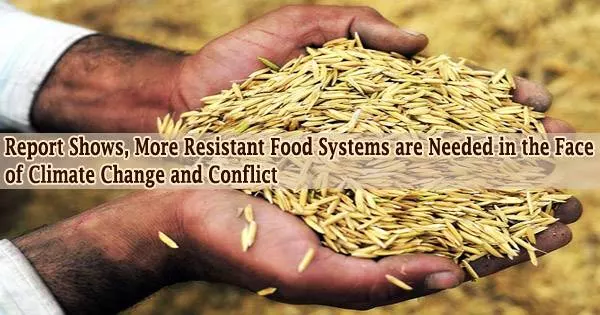A recent study led by the University of Colorado Boulder predicts that rising water demand will be the biggest threat to food security over the next 20 years, followed closely by heat waves, droughts, income inequality, and political unrest. The study urges increased cooperation to create a more resilient global food supply.
The report was released today in One Earth, and according to the UN and The World Bank, severe food insecurity may get worse this year in many countries, breaking the previous record for hunger set in 2020.
The effects of political strife and the accumulating environmental repercussions of climate change have been measured and researched globally for some time, so these urgent challenges are not new. The current research reveals, however, that closer cooperation between these fields of study could boost global food security not only against any one of these risks, but also against all of them.
“We provide strong support for the idea of building more resilient food systems in general, rather than trying to deal with individual problems here and there,” said Zia Mehrabi, lead author on the study, and assistant professor of environmental studies and in the Mortenson Center in Global Engineering. “It doesn’t matter whether it’s a climate, environmental or political shock to the system if you have resilient systems in place, they’ll be able to deal with all the different kinds of shocks.”
By reversing years of development progress and driving food prices to all-time highs, the war in Ukraine, supply chain disruptions, and the ongoing economic effects of the COVID-19 pandemic, according to a recent analysis by The World Bank, are working against the UN’s goal to end hunger, food insecurity, and malnutrition in all of its forms by 2030.
Furthermore, extreme occurrences like heat waves, floods, and droughts are becoming more frequent. While developing solutions to increase the resilience of food systems, researchers and policymakers frequently work alone and focus on a single issue at a time.
In order to provide decision-makers with thorough information, up-to-date models, and useful tools when dangers emerge, the new study revealed that there is a critical need for more collaboration and coordination between academics who investigate particular vulnerabilities to food systems.
We can see it happening in our world right now, conflict and climate getting worse. The trends show, and experts agree, on this getting worse in the future. How are we going to build and govern food systems that are resilient to all different kinds of shocks and extreme events? We need to start thinking about how we can build systems that can adapt and cope with all of them.
Zia Mehrabi
Conflict, climate and capacity
The researchers polled 69 international experts in diverse disciplines connected to food security in 2019 prior to the COVID-19 outbreak. 32 major challenges to food security were ranked by their likelihood and impact over the next two decades.
They discovered that a variety of environmental changes brought on by climate change, such as erratic weather patterns, may have the worst effects on food security. Increased water demand, drought, heat waves, and the collapse of ecosystem services (natural benefits we depend on every day from the environmental systems around us) were ranked as having the greatest impact and likelihood.
However, they also discovered that the likelihood of threats to food security posed by income inequality, global price shocks, political unrest, and migration occurring over the next 20 years is high, placing these threats in the top 10.
More than half of the world’s hungry people reside in conflict-prone areas, such as failed nations or areas where there is political turbulence, terrorism, civil unrest, or military conflict. In the next 20 years, one of the top 5 most likely dangers to global food security is the migration and displacement brought on by these conflicts.
“Food security is not a problem of production, it’s a problem of distribution, access and poverty, and that is exacerbated by conflict,” said Mehrabi. “Conflict not only makes people more vulnerable, but also limits their ability to adapt.”
Even conflict itself is not new. Civil wars like those in Syria, Yemen, and other places have continued to endanger regional and global food security prior to the crisis in Ukraine and the ongoing civil war in Ethiopia.
“If we’d already been focused on addressing conflict and extreme events when COVID happened, we would have been in a much better situation,” said Mehrabi.
Research for resilience
In addition, the researchers enquired of the surveyed specialists the top 50 issues that scientists and decision-makers should be concentrating on, as well as the most important outstanding research priorities in these fields.
Diversification of the food system was valued by many since generally more stable systems have more diversity. For instance, in 2021, Ukraine supplied 10% of the world’s wheat exports and 40% of the wheat supplies for the World Food Program, a supply that was badly disrupted by Russia’s aggression against the nation in 2022.
While we cannot change where agricultural land is distributed, Mehrabi noted, researchers and policymakers might ask: How can countries diversify their food production, both in terms of location and nutritional output?
Additionally, research can improve maps and forecasts, which can guide proactive measures to maintain food security before to, during, and after extreme occurrences. Mehrabi notes that many models are not tested with matching on-the-ground observations, and the data collecting that underlies our maps has not kept up with the sophisticated tools that academics have at their disposal now for prediction.
“We can see it happening in our world right now, conflict and climate getting worse. The trends show, and experts agree, on this getting worse in the future,” said Mehrabi. “How are we going to build and govern food systems that are resilient to all different kinds of shocks and extreme events? We need to start thinking about how we can build systems that can adapt and cope with all of them.”





